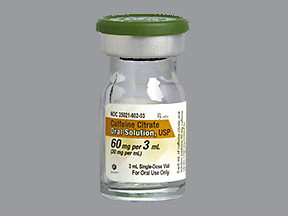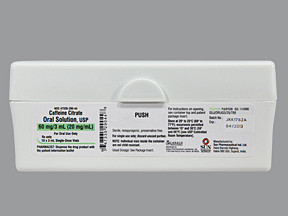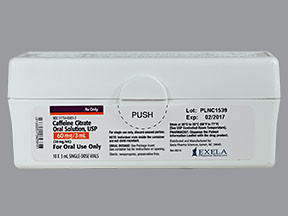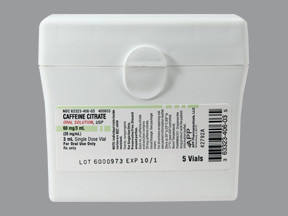CAFFEINE CITRATE SOLUTION - ORAL
PHONETIC PRONUNCIATION: (KAF-een SIT-rate)
COMMON BRAND NAME(S): Cafcit
GENERIC NAME(S): caffeine citrate
Uses
USES: This medication is used for the short-term treatment of a breathing problem (apnea) in premature infants. Caffeine blocks certain proteins (adenosine receptors) which lead to improved breathing in these infants.
How to use CAFFEINE CITRATE SOLUTION - ORAL
HOW TO USE: This medication is usually given once daily by mouth or through a feeding tube; with or without formula. The dosage is based on your infant's weight, medical conditions, and response to therapy. Carefully measure each dose with the provided dosing syringe. Before using, check this product visually for particles or discoloration. If either is present, do not use the liquid. Because this product does not contain preservatives, discard any unused medicine after preparing the dose for your infant. Use this medication regularly in order to get the most benefit from it. Remember to use it at the same time each day. If your infant's condition persists or worsens, contact your doctor or pharmacist. Read the Patient Information Leaflet available from your pharmacist. Consult your doctor or pharmacist if you have any questions.
Side Effects
Precautions
Interactions
Overdose
Images
Reviews
Faq for CAFFEINE CITRATE SOLUTION - ORAL
Caffeine citrate solution is used primarily for the treatment of apnea of prematurity in premature infants.
Caffeine citrate stimulates the central nervous system, promoting the resumption and maintenance of regular breathing patterns in premature infants.
The exact dosage of caffeine citrate solution will depend on the weight and condition of the infant. It is typically administered once daily, either as an oral solution or through a feeding tube.
Common side effects may include jitteriness, irritability, rapid breathing, and increased heart rate. More serious side effects such as seizures and breathing difficulties should be reported to a healthcare professional immediately.
Caffeine citrate solution is generally considered safe when administered under medical supervision. However, it is essential to follow the recommended dosage and consult a pediatrician or neonatologist.
The effects of caffeine citrate solution can be seen within hours of administration, with improvements in respiratory function within a few days.
Caffeine citrate solution should not be mixed with other medications or formula unless specifically instructed by a healthcare professional. It is important to follow the administration instructions provided by the pharmacist or doctor.
Caffeine citrate may interact with certain medications, such as theophylline or fluconazole. It is crucial to inform the healthcare provider about all medications being taken to prevent any potential interactions.
If a dose of caffeine citrate solution is missed, it should be given as soon as possible. However, it should not be doubled up or taken close to the next scheduled dose.
Disclaimer
IMPORTANT: HOW TO USE THIS INFORMATION: This is a summary and does NOT have all possible information about this product. This information does not assure that this product is safe, effective, or appropriate for you. This information is not individual medical advice and does not substitute for the advice of your health care professional. Always ask your health care professional for complete information about this product and your specific health needs.





No Reviews Yet